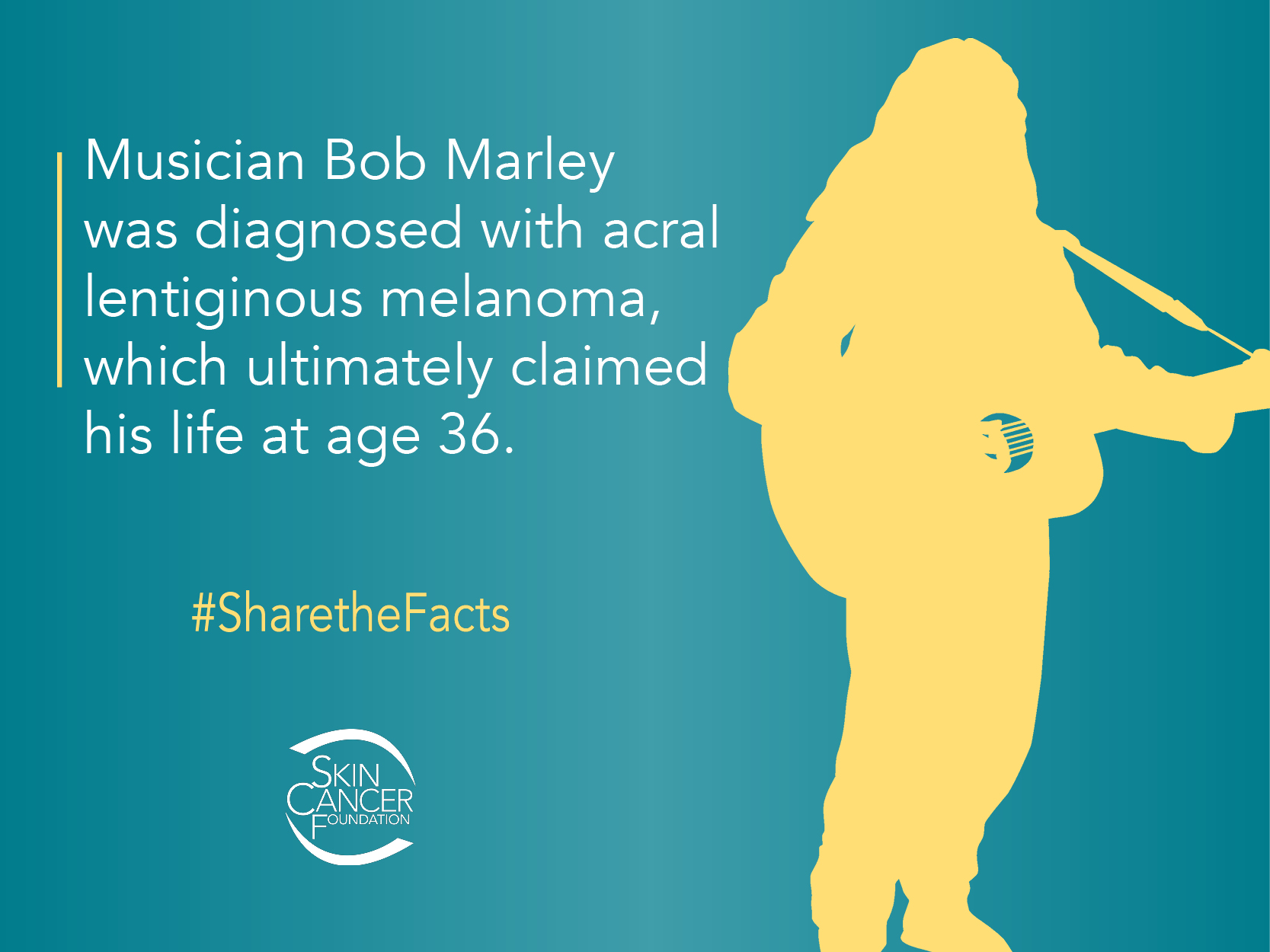Did Bob Marley Die Of Skin Cancer? Exploring The Truth Behind The Legend
Bob Marley’s legacy continues to inspire millions worldwide, but many are curious about the cause of his death. Did Bob Marley die of skin cancer? This article delves into the facts surrounding his health struggles, exploring the truth behind this question while honoring his life and contributions to music and culture.
Bob Marley's story is one of resilience, passion, and unwavering dedication to his craft. However, his life was tragically cut short by a condition that many might not expect—a form of skin cancer. Understanding the details of his diagnosis and treatment provides valuable insights into the importance of early detection and awareness.
This article will explore Bob Marley's journey with cancer, the medical facts surrounding his condition, and the lessons we can learn from his experience. By examining both his personal life and the broader implications of his illness, we hope to shed light on a topic that affects millions globally.
Read also:Natalie Pasquarella Husband The Inside Story You Need To Know
Table of Contents
- Bob Marley's Biography
- Did Bob Marley Die of Skin Cancer?
- Understanding Skin Cancer
- Bob Marley's Diagnosis
- His Treatment Journey
- Debunking Myths About Bob Marley's Death
- The Importance of Skin Cancer Awareness
- Preventive Measures Against Skin Cancer
- Bob Marley's Legacy and Impact
- Conclusion: Lessons Learned
Bob Marley's Biography
Early Life and Career
Bob Marley, born Nesta Robert Marley on February 6, 1945, in Nine Mile, Saint Ann Parish, Jamaica, is one of the most iconic figures in the history of music. His unique blend of reggae, ska, and rocksteady resonated with audiences across the globe. Growing up in a modest background, Marley faced numerous challenges but remained steadfast in his pursuit of music and activism.
Below is a summary of his personal data:
| Full Name | Nesta Robert Marley |
|---|---|
| Date of Birth | February 6, 1945 |
| Place of Birth | Nine Mile, Saint Ann Parish, Jamaica |
| Occupation | Singer, Songwriter, Activist |
| Spouse | Rita Anderson Marley |
| Children | 11 acknowledged children |
Did Bob Marley Die of Skin Cancer?
Bob Marley passed away on May 11, 1981, at the age of 36, after battling a rare form of skin cancer known as acral lentiginous melanoma. This subtype of melanoma primarily affects dark-skinned individuals and typically develops on areas of the body with less pigment, such as the soles of the feet or palms of the hands.
Although melanoma is often associated with sun exposure, acral lentiginous melanoma is not linked to UV radiation. Its occurrence in Marley highlights the importance of recognizing that skin cancer can affect anyone, regardless of skin tone or lifestyle.
Understanding Skin Cancer
Types of Skin Cancer
Skin cancer is broadly categorized into three main types: basal cell carcinoma, squamous cell carcinoma, and melanoma. Melanoma, the most severe form, accounts for approximately 1% of skin cancer cases but causes the majority of skin cancer-related deaths.
- Basal Cell Carcinoma: The most common type, usually slow-growing and rarely spreads to other parts of the body.
- Squamous Cell Carcinoma: More aggressive than basal cell carcinoma, it can spread if left untreated.
- Melanoma: A highly aggressive cancer that can spread rapidly to other organs if not detected early.
Bob Marley's Diagnosis
Marley was initially diagnosed with acral lentiginous melanoma in 1977 after noticing a dark spot under his toenail. Despite medical advice to have the toe amputated, Marley refused, citing his religious beliefs and the potential impact on his ability to play music. This decision delayed further treatment and allowed the cancer to progress.
Read also:How Do You Record A Video On Instagram A Beginners Guide To Mastering The Art Of Ig Videos
By 1980, the cancer had metastasized to his lungs and brain, leading to his eventual death. Marley's story underscores the critical importance of early intervention and adherence to medical recommendations.
His Treatment Journey
Challenges Faced During Treatment
Bob Marley sought treatment in Germany, where he underwent an alternative therapy known as Issels Therapy. This treatment focused on boosting the immune system and addressing the root causes of cancer. However, the advanced stage of his cancer made recovery unlikely.
During his final months, Marley continued to perform and record music, determined to leave a lasting legacy. His strength and determination inspired millions, even in the face of adversity.
Debunking Myths About Bob Marley's Death
There are several misconceptions surrounding Bob Marley's death. Some believe his cancer was caused by smoking marijuana, while others claim it was due to poor lifestyle choices. However, scientific evidence supports the fact that his condition was a result of acral lentiginous melanoma, a rare and aggressive form of skin cancer.
The Importance of Skin Cancer Awareness
Raising awareness about skin cancer is crucial, especially for communities of color, who may underestimate their risk. Early detection significantly improves survival rates, making regular skin checks and self-examinations essential practices.
According to the American Academy of Dermatology, melanoma incidence rates have been increasing over the past few decades. Education and prevention are key to reducing these numbers.
Preventive Measures Against Skin Cancer
Tips for Protecting Your Skin
- Apply sunscreen with at least SPF 30 daily.
- Avoid prolonged sun exposure, especially during peak hours (10 a.m. to 4 p.m.).
- Wear protective clothing, such as wide-brimmed hats and long-sleeved shirts.
- Perform regular skin self-examinations and report any unusual changes to a healthcare professional.
Bob Marley's Legacy and Impact
Bob Marley's influence extends far beyond his music. He used his platform to advocate for social justice, equality, and peace. His message of unity and love continues to resonate with fans worldwide, inspiring new generations to embrace positivity and change.
Marley's battle with cancer serves as a poignant reminder of the importance of health awareness and proactive care. His legacy lives on through his music, his family, and the countless lives he touched during his lifetime.
Conclusion: Lessons Learned
In conclusion, Bob Marley's death from acral lentiginous melanoma highlights the critical need for increased awareness and education about skin cancer. While his story is tragic, it also serves as a powerful reminder of the importance of early detection and adherence to medical advice.
We invite you to share this article with others and encourage them to prioritize their health. For more insightful content, explore our other articles and join the conversation by leaving a comment below. Together, we can honor Bob Marley's legacy by spreading knowledge and promoting positive change.
References:
- World Health Organization. (2023). Skin Cancer Fact Sheet.
- American Academy of Dermatology. (2023). Melanoma Statistics and Prevention.
- Issels Clinic. (2023). History of Issels Therapy.


